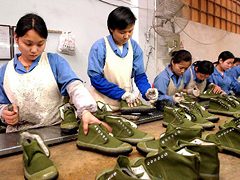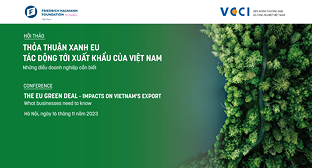EU Prolongs Duties on Chinese, Vietnamese Footwear
23/12/2009 12:00

Dec. 22 (Bloomberg) -- The European Union extended tariffs on Chinese and Vietnamese shoes for 15 months in a bid to help southern EU producers compete against lower-cost footwear imported by companies such as Nike Inc., Puma AG and Adidas AG.
The extension of the duties as high as 16.5 percent on leather shoes is a compromise because a U.K.-led group of northern European nations opposed re-imposing the levies for the usual five-year period. The duties aim to counter below-cost -- or “dumped” -- imports from China and Vietnam.
The EU goal is to curb competition for 8,000 European leather-footwear manufacturers, mainly small businesses in southern Europe. Four-fifths of the EU’s leather shoes come from Italy, Portugal and Spain, where producers are in the process of becoming more competitive, according to the bloc.
European shoe manufacturers are “adapting their business models to the challenges of the globalized market,” the 27- nation EU said in a decision today in Brussels. “Should measures be maintained, they will serve as an additional safety net and allow for more time to continue this process.”
The trade protection helped reduce Chinese and Vietnamese exporters’ combined share of the EU shoe market to 28.7 percent in the 12 months through June 2008 from 35.5 percent in 2005, according to the bloc. Over the period, China’s share fell to 18.5 percent from 22.9 percent and Vietnam’s share dropped to 10.2 percent from 12.6 percent, said the EU.
Chinese Exporters
The EU’s 2006 decision to impose the levies on 9.7 billion euros ($13.9 billion) of Chinese and Vietnamese footwear for two years was itself a compromise because such anti-dumping measures usually last for five years. The levies are 16.5 percent against all Chinese exporters except Golden Step, which faces a 9.7 percent duty, and 10 percent against all Vietnamese exporters.
The U.K. government and 12 EU allies tried unsuccessfully to block even the 15-month prolongation. The group, which also included nations such as the Netherlands, Sweden and Denmark, fell one country short of the majority needed.
“Continuing these measures damages trade,” U.K. Business Secretary Peter Mandelson said. “I hope the EU will in future see the importance of turning its back on protectionism.”
In April 2008, the EU extended the 16.5 percent duty to Macau after finding that Chinese exporters shipped leather shoes via the former Portuguese colony or assembled them there to evade the levy. Macau, a special administrative region of China, wasn’t subject initially to the tax, which Chinese shoemakers including Aokang Group and European retailers such as C&J Clark Ltd. opposed.
European Manufacturers
A group representing European companies that fought against the EU duties said it was “deeply disappointed” by the 15- month continuation. The European Footwear Alliance said that, by the time the measures expire in April 2011, shoe businesses in Europe will have faced duty payments totaling “well in excess of 1 billion euros, which will ultimately be paid for by EU consumers.”
The benefits of prolonging the trade protection for European manufacturers outweigh the disadvantages for importers and retailers, according to the EU. It described the situation of importers as “generally healthy” and the market position of retailers as “strong.”
Shoppers can also cope, the EU said. “There was no noticeable price increase following the imposition of the anti- dumping duties,” said the bloc. “There are no indications that consumer prices will increase disproportionately in the future.”
Since early October 2008, when they were originally due to expire, the duties have automatically stayed in place while the EU considered whether to re-impose them. Such reviews must be completed within 15 months.
The 15-month prolongation, including the extension to cover Macau, will take effect when published in the EU Official Journal by early January.
Last Updated: December 22, 2009 11:15 EST
By Jonathan Stearns
To contact the reporter on this story: Jonathan Stearns in Brussels at jstearns2@bloomberg.net
Source: www.bloomberg.com
By Jonathan Stearns
To contact the reporter on this story: Jonathan Stearns in Brussels at jstearns2@bloomberg.net
Source: www.bloomberg.com
Các tin khác
- Vietnam and Southeast Asian Solar Firms Face US Anti-Dumping, Anti-Subsidy Probe (03/05/2024)
- Infrastructure development creates momentum for exports to "neighboring" markets (03/05/2024)
- Seaports increase services to attract goods (03/05/2024)
- Chinese EV makers risk tougher duties over failure to cooperate with EU probe (03/05/2024)
- RoK burgeoning market for Vietnam’s agro-forestry-fisheries exports (03/05/2024)
 Home
Home
 About Us
About Us




















